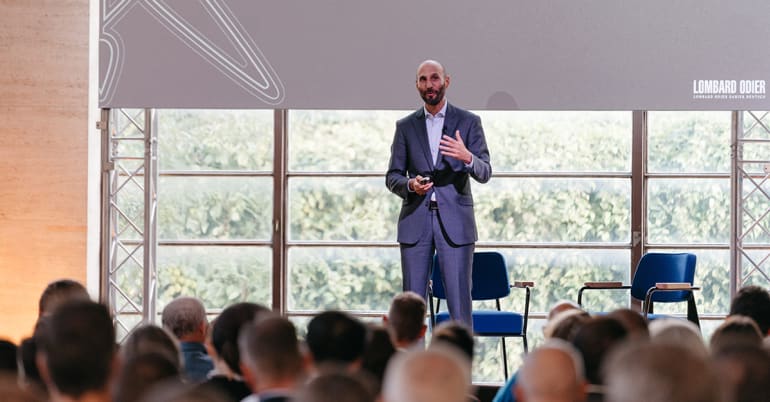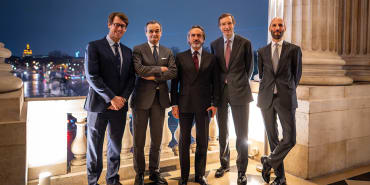Tariff increases and the fragmentation of economic blocs: 2025 is a year in which old certainties are being challenged. At our latest Rethink Perspectives event, held in Sion in the Swiss Valais, Samy Chaar, Lombard Odier Chief Economist and CIO Switzerland, delivered a clear picture of the risks and opportunities emerging in this new economic order. Global growth has not been derailed, he explained, but it has left the highway. Investors must now adapt to a steeper route, marked by geopolitical twists and turns and reduced visibility for businesses.
Alongside Serge Fehr, Head of the Swiss Domestic Region at Lombard Odier, Samy Chaar outlined the driving forces behind this changing regime: the end of a cycle of American outperformance, Europe’s inertia and a return to the role of the State as a buffer in times of crisis. In this context, is the current slowdown at risk of turning into a recession? Does Europe have the means to reclaim its sovereignty in key sectors like energy, technology and defence? And, above all, how should portfolios be structured in today’s unstable, fragmented world?
The global economy has left “the growth highway” of the post-COVID world and taken a challenging mountain road
From the growth highway to the mountain route
Samy Chaar began with a metaphor that immediately became a key theme of the event: the global economy has left “the growth highway” of the post-COVID world and taken a challenging mountain road, he said.
This image, he explained, illustrates the change of economic regime initiated by the Trump administration in January 2025. “In the post-COVID world, the United States moved faster than the rest of the world along the growth highway. Europe followed at a slower pace, with Germany lagging further behind. Today we have left this highway and taken a mountain route.”
This new path is strewn with uncertainties, marking the end of a cycle of comfortable growth, he continued, noting that while we will have to contend with a more complex economy, there is no need to succumb to pessimism. “We are still advancing, but with greater difficulty,” he concluded.
Read also: Tariffs and tailwinds: how to invest in H2 2025
2025, between uncertainty and trade tariffs
What is behind this change in route? For Samy Chaar, it can be explained by two major ruptures. Firstly, increasing uncertainty: “With the arrival of the new Trump administration and its aggressive tariff strategy, uncertainty has moved up a notch,” he said. The post-COVID environment gave businesses good visibility of the road ahead – this is no longer the case, he explained. “Companies would rather do less than do more – hire less, invest less, produce less.”
The tariff hikes imposed by Washington, some of them above 30%, are disrupting trade balances
Secondly, the tariff hikes imposed by Washington, some of them above 30%, are disrupting trade balances. No-one will be spared, he said: “Overseas exporters will pay these tariffs to keep their market share, but American businesses will pay too, because they will not want to pass the whole cost on to consumers. Consumers will, for their part, also have to pay more.”
These two shocks, caused by structural uncertainty and American protectionism (at a level unheard of since the 1930s), mark a historic rupture, though recession risks remain limited.
Read also: 100 years of customs duties: the eventful history of US trade
Safety nets as a hedge against crisis risk
For Samy Chaar, there are a number of reasons why the global economy should not tip over into recession. Firstly, the resilience of the job market: “Businesses are no longer hiring, but there are also fewer layoffs. And, for the time being, they are holding on to their workforce.” This is evidenced by the unemployment figures in the United States, which have remained stable at around 4.2% since January 20251, he explained.
Secondly, wage growth is offsetting inflation. “Americans earn around 4% more each year, and tariff-driven inflation is around 3%. Real income is positive, though falling,” Samy Chaar noted.
The risk of a crisis can be further reduced through the support of public policies. Here, public spending, albeit debt-funded, plays a stabilising role. “Donald Trump’s expansionist policy prevents the derailing of the economic engine,” Samy Chaar said. The same is true for Europe where, after a decade of underinvestment, we are witnessing a rebound, with Germany leading the way. In 2025, the country announced several major investment initiatives, such as ‘Made for Germany’, led by over 60 private players pledging to invest more than EUR 600 billion2.
Asked about Switzerland and the tariffs imposed by the Trump administration, Samy Chaar played down their impact… Gold and pharma account for 60% of Swiss exports to the United States and are not affected. The average actual rate is therefore more like 17%
Asked about Switzerland and the tariffs imposed by the Trump administration, Samy Chaar played down their impact, highlighting the vitality of the Swiss economy. “It is not a blanket 39% for all exports,” he explained. “Gold and pharma account for 60% of Swiss exports to the United States and are not affected. The average actual rate is therefore more like 17%.” Underlining the capacity of the Swiss Confederation to sustain its economy, he continued, “It has the means to help the businesses and households affected. There is no doubt as to Switzerland’s capacity to overcome the challenge we face from the United States today.”
Read also: Despite US tariffs, Switzerland still controls its own destiny
Low rates, China and economic sovereignty
Another factor helping the economy to stay on track is central bank decision-making, Samy Chaar explained: “The Swiss National Bank cut its interest rates to zero, the European Central Bank has cut them eight times and the Federal Reserve will likely follow.” Added to that are budgetary measures in China, where the government continues to support domestic demand. “As long as Beijing maintains domestic investment, Chinese growth will avoid recession,” he added.
Interdependence is now deemed a vulnerability. Regaining sovereignty will prove costly, as it requires investing
Beyond economic policies, a deeper shift is underway, he explained, as we move from a world of globalisation, based on interdependence, to a world fragmented into distinct blocs. “Interdependence is now deemed a vulnerability. Regaining sovereignty will prove costly, as it requires investing,” he said. In energy, defence, infrastructure, and technology, governments have no choice but to borrow to reclaim their autonomy. Not all debt is necessarily bad, Samy Chaar noted, offering a nuanced approach to the classical view: “If a state spends in order to increase economic performance, the debt is a good one.”
Asset allocation: vigilance and diversification
In this context, what should the strategy be for portfolio allocation? Samy Chaar outlined three key avenues:
1. Stay invested: “The economic engine moves forward. Businesses continue to make profits. Households have income to sustain saving and spending. In the absence of a recession, there is no reason to be divested.”
2. Diversify assets: “Previously, the US economy outperformed. Today we are reducing the US weighting (USD and US equities) in many portfolios, in order to integrate more European businesses, the Swiss franc, the euro and emerging-market currencies.”
3. Stabilise: through high-quality bonds and income-generating real estate during peaks in volatility – “these are our lines of defence.”
Read also: Examining the gold price rally | Outlook and forecast
As Rethink Perspectives drew to a close, Samy Chaar returned to his central theme, calling to mind his clear conviction that although the economic and investment road is now steeper, the likelihood of an accident has not increased.
Faced with a world marked by uncertainty, a rise in power relationships and economic fragmentation, our response requires rigorous analysis, diversification and implementation of appropriate lines of defence. At Lombard Odier, our ability to take a step back in order to gain a clear view of the way ahead, so we can support our clients in times of upheaval, is a crucial advantage as we help to navigate this new world order.







share.